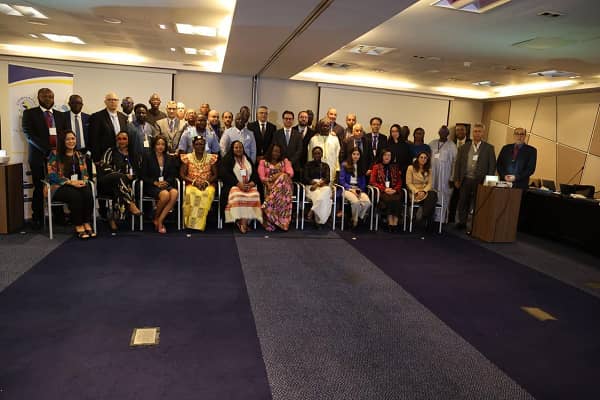Fez, Morocco
In a collaboration aimed at catalyzing effective communication strategies to propel a sustainable blue economy forward, the Ministerial Conference for Fisheries Cooperation in African States bordering the Atlantic Ocean (ATLAFCO) and the Media Observatory for Sustainable Fisheries in Africa (MOSFA) recently joined forces to host a dynamic workshop on March 26th and 27th, 2024, in Fez, Morocco.
Themed “Communication for a Sustainable and Inclusive Blue Economy,” the workshop is a tangible outcome of ATLAFCO’s visionary partnership with MOSFA and aligns seamlessly with its ambitious action plan for the year 2024. Acknowledging the pivotal role of aquatic and marine resources in driving Africa’s socio-economic development, the workshop aims to ignite heightened awareness and foster innovative communication strategies to propel the blue economy agenda to new heights.
Setting the tone for the event, His Excellency Mr. Mohamed SADIKI, Minister of Agriculture, Maritime Fisheries, Rural Development, and Water and Forests (Kingdom of Morocco), delivered a poignant opening address. In his speech, he eloquently highlighted both the challenges and opportunities inherent in the sector, emphasizing the transformative power of effective communication in championing sustainable practices. With unwavering conviction, he underscored the imperative to educate the public on the vast potential and critical challenges facing the blue economy.
Leo Aissoun, the astute Coordinator of MOSFA, echoed these sentiments, emphasizing the paramount importance of bolstering blue economy development across nations through comprehensive education and targeted public awareness initiatives. His impassioned plea resonated deeply with attendees, igniting a collective resolve to prioritize communication as a catalyst for positive change.
Mr. Taoufik El Ktiri, the Executive Secretary of COMHAFAT, took the stage to illuminate the intricate interplay of aquatic ecosystems and underscored the pressing need for integrated initiatives to foster the continent’s holistic development. With compelling clarity, he delineated the pivotal role of media in disseminating crucial knowledge and crafting narratives that inspire action. Proposing a visionary roadmap for future endeavors, Mr. El Ktiri articulated a bold vision for leveraging communication as a hub for sustainable progress.
One of the notable participants at the meeting was the African Union/Inter-African Bureau for Animal Resources (AU-IBAR). Dr. Patrick KARANI, representing AU-IBAR, delivered a presentation titled “Africa’s Blue Economy Strategy” during Session I: The Sustainable and Inclusive Blue Economy: Conceptual Approach and Regional Strategies.
Dr. Karani’s presentation provided a comprehensive overview of Africa’s Blue Economy Strategy, highlighting its complexity and emphasizing its cross-cutting multisectoral approach. He underscored the critical importance of sustainability in the strategy’s implementation, stressing the necessity for robust governance structures, enhanced cooperation, and effective coordination mechanisms.
Moreover, Dr. Karani emphasized the imperative to address national interests within the framework of the Blue Economy Strategy. He highlighted the indispensable role of partnerships and financing mechanisms in driving the agenda forward.
Additionally, he emphasized the urgent need for capacity building, including the adoption of relevant knowledge and technologies, to facilitate successful implementation of the strategy.
In addition to Dr. Patrick Karani’s presentation, Mrs. Patricia Lumba, Senior Knowledge Management Officer at AU-IBAR, contributed to the meeting by delivering a presentation titled “Communication for the Development of a Sustainable Blue Economy in Africa” during Session IV: Communication in Favor of a Sustainable and Inclusive Blue Economy in the COMHAFAT Region.
Lumba’s presentation delved into the crucial role of communication in advancing the cause of a sustainable Blue Economy in Africa. She particularly focused on the role of media as intermediaries and highlighted the significance of citizen science in this context. Lumba put forth several recommendations aimed at strengthening citizen science initiatives within the Blue Economy framework.
Lumba emphasized the need for media to act as effective intermediaries, translating complex scientific concepts into accessible and engaging content for broader public consumption. She recommended the adoption of innovative storytelling techniques and the utilization of various media platforms to reach diverse audiences effectively. Furthermore, Lumba stressed the importance of empowering citizens as citizen scientists, encouraging active participation in data collection, monitoring, and decision-making processes related to the Blue Economy. She suggested providing training and resources to facilitate citizen engagement and ensure the credibility and reliability of gathered data for use by media.
Moreover, Lumba underscored the necessity for media organizations to prioritize accurate and balanced reporting on Blue Economy issues, avoiding sensationalism and misinformation. She proposed fostering partnerships between media outlets, scientific institutions, and governmental agencies to promote transparency and accountability in information dissemination.
Additionally, Lumba highlighted the potential of leveraging digital technologies and social media platforms to amplify awareness and advocacy efforts for the Blue Economy. She recommended the development of targeted digital communication campaigns tailored to specific audiences and demographics.
The workshop aimed to raise awareness among MOSFA members regarding the blue economy concept and enable effective communication support for the implementation of regional and national strategies. It revolves around themes such as the challenges of sustainable and inclusive blue economy in Africa, the role of African media in raising awareness, and concludes with recommendations and conclusions.
The primary beneficiaries of the workshop were MOSFA members, including journalists and communicators from ATLAFCO member states, representing diverse media platforms. The outcomes of the workshop included a comprehensive understanding of the blue economy concept, exploration of partnership prospects between MOSFA and ATLAFCO, and other institutions; such as AU-IBAR in the implementation of strategic communications on the blue economy.
Drawing upon the expertise of members from MOSFA and ATLAFCO, alongside invited experts, the workshop represented a pivotal step towards fostering effective communication strategies for a sustainable and inclusive blue economy in Africa. It epitomizes the collaborative spirit between ATLAFCO, MOSFA, and AU-IBAR towards shared prosperity and environmental stewardship. The workshop culminated in the presentation of recommendations and conclusions, marking a collaborative milestone in the journey towards a prosperous and environmentally conscious Blue Economy in Africa.

